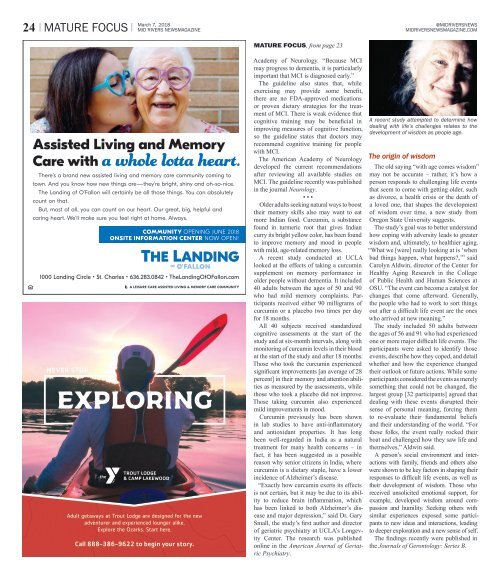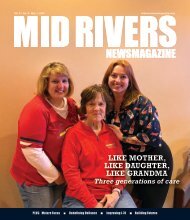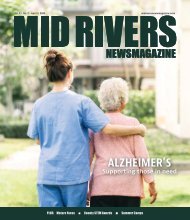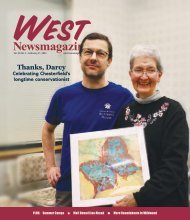Mid Rivers Newsmagazine 3-7-18
Local news, local politics and community events for St. Charles County Missouri.
Local news, local politics and community events for St. Charles County Missouri.
You also want an ePaper? Increase the reach of your titles
YUMPU automatically turns print PDFs into web optimized ePapers that Google loves.
24 I MATURE FOCUS I<br />
March 7, 20<strong>18</strong><br />
MID RIVERS NEWSMAGAZINE<br />
@MIDRIVERSNEWS<br />
MIDRIVERSNEWSMAGAZINE.COM<br />
MATURE FOCUS, from page 23<br />
Assisted Living and Memory<br />
Care with a whole lotta heart.<br />
There’s a brand new assisted living and memory care community coming to<br />
town. And you know how new things are—they’re bright, shiny and oh-so-nice.<br />
The Landing of O’Fallon will certainly be all those things. You can absolutely<br />
count on that.<br />
But, most of all, you can count on our heart. Our great, big, helpful and<br />
caring heart. We’ll make sure you feel right at home. Always.<br />
COMMUNITY OPENING JUNE 20<strong>18</strong><br />
ONSITE INFORMATION CENTER NOW OPEN!<br />
1000 Landing Circle • St. Charles • 636.283.0842 • TheLandingOfOFallon.com<br />
NEVER STOP<br />
EXPLORING<br />
Adult getaways at Trout Lodge are designed for the new<br />
adventurer and experienced lounger alike.<br />
Explore the Ozarks. Start here.<br />
Call 888-386-9622 to begin your story.<br />
Academy of Neurology. “Because MCI<br />
may progress to dementia, it is particularly<br />
important that MCI is diagnosed early.”<br />
The guideline also states that, while<br />
exercising may provide some benefit,<br />
there are no FDA-approved medications<br />
or proven dietary strategies for the treatment<br />
of MCI. There is weak evidence that<br />
cognitive training may be beneficial in<br />
improving measures of cognitive function,<br />
so the guideline states that doctors may<br />
recommend cognitive training for people<br />
with MCI.<br />
The American Academy of Neurology<br />
developed the current recommendations<br />
after reviewing all available studies on<br />
MCI. The guideline recently was published<br />
in the journal Neurology.<br />
• • •<br />
Older adults seeking natural ways to boost<br />
their memory skills also may want to eat<br />
more Indian food. Curcumin, a substance<br />
found in turmeric root that gives Indian<br />
curry its bright yellow color, has been found<br />
to improve memory and mood in people<br />
with mild, age-related memory loss.<br />
A recent study conducted at UCLA<br />
looked at the effects of taking a curcumin<br />
supplement on memory performance in<br />
older people without dementia. It included<br />
40 adults between the ages of 50 and 90<br />
who had mild memory complaints. Participants<br />
received either 90 milligrams of<br />
curcumin or a placebo two times per day<br />
for <strong>18</strong> months.<br />
All 40 subjects received standardized<br />
cognitive assessments at the start of the<br />
study and at six-month intervals, along with<br />
monitoring of curcumin levels in their blood<br />
at the start of the study and after <strong>18</strong> months.<br />
Those who took the curcumin experienced<br />
significant improvements [an average of 28<br />
percent] in their memory and attention abilities<br />
as measured by the assessments, while<br />
those who took a placebo did not improve.<br />
Those taking curcumin also experienced<br />
mild improvements in mood.<br />
Curcumin previously has been shown<br />
in lab studies to have anti-inflammatory<br />
and antioxidant properties. It has long<br />
been well-regarded in India as a natural<br />
treatment for many health concerns – in<br />
fact, it has been suggested as a possible<br />
reason why senior citizens in India, where<br />
curcumin is a dietary staple, have a lower<br />
incidence of Alzheimer’s disease.<br />
“Exactly how curcumin exerts its effects<br />
is not certain, but it may be due to its ability<br />
to reduce brain inflammation, which<br />
has been linked to both Alzheimer’s disease<br />
and major depression,” said Dr. Gary<br />
Small, the study’s first author and director<br />
of geriatric psychiatry at UCLA’s Longevity<br />
Center. The research was published<br />
online in the American Journal of Geriatric<br />
Psychiatry.<br />
A recent study attempted to determine how<br />
dealing with life’s challenges relates to the<br />
development of wisdom as people age.<br />
The origin of wisdom<br />
The old saying “with age comes wisdom”<br />
may not be accurate – rather, it’s how a<br />
person responds to challenging life events<br />
that seem to come with getting older, such<br />
as divorce, a health crisis or the death of<br />
a loved one, that shapes the development<br />
of wisdom over time, a new study from<br />
Oregon State University suggests.<br />
The study’s goal was to better understand<br />
how coping with adversity leads to greater<br />
wisdom and, ultimately, to healthier aging.<br />
“What we [were] really looking at is ‘when<br />
bad things happen, what happens?,’” said<br />
Carolyn Aldwin, director of the Center for<br />
Healthy Aging Research in the College<br />
of Public Health and Human Sciences at<br />
OSU. “The event can become a catalyst for<br />
changes that come afterward. Generally,<br />
the people who had to work to sort things<br />
out after a difficult life event are the ones<br />
who arrived at new meaning.”<br />
The study included 50 adults between<br />
the ages of 56 and 91 who had experienced<br />
one or more major difficult life events. The<br />
participants were asked to identify those<br />
events, describe how they coped, and detail<br />
whether and how the experience changed<br />
their outlook or future actions. While some<br />
participants considered the events as merely<br />
something that could not be changed, the<br />
largest group [32 participants] agreed that<br />
dealing with these events disrupted their<br />
sense of personal meaning, forcing them<br />
to re-evaluate their fundamental beliefs<br />
and their understanding of the world. “For<br />
these folks, the event really rocked their<br />
boat and challenged how they saw life and<br />
themselves,” Aldwin said.<br />
A person’s social environment and interactions<br />
with family, friends and others also<br />
were shown to be key factors in shaping their<br />
responses to difficult life events, as well as<br />
their development of wisdom. Those who<br />
received unsolicited emotional support, for<br />
example, developed wisdom around compassion<br />
and humility. Seeking others with<br />
similar experiences exposed some participants<br />
to new ideas and interactions, leading<br />
to deeper exploration and a new sense of self.<br />
The findings recently were published in<br />
the Journals of Gerontology: Series B.

















